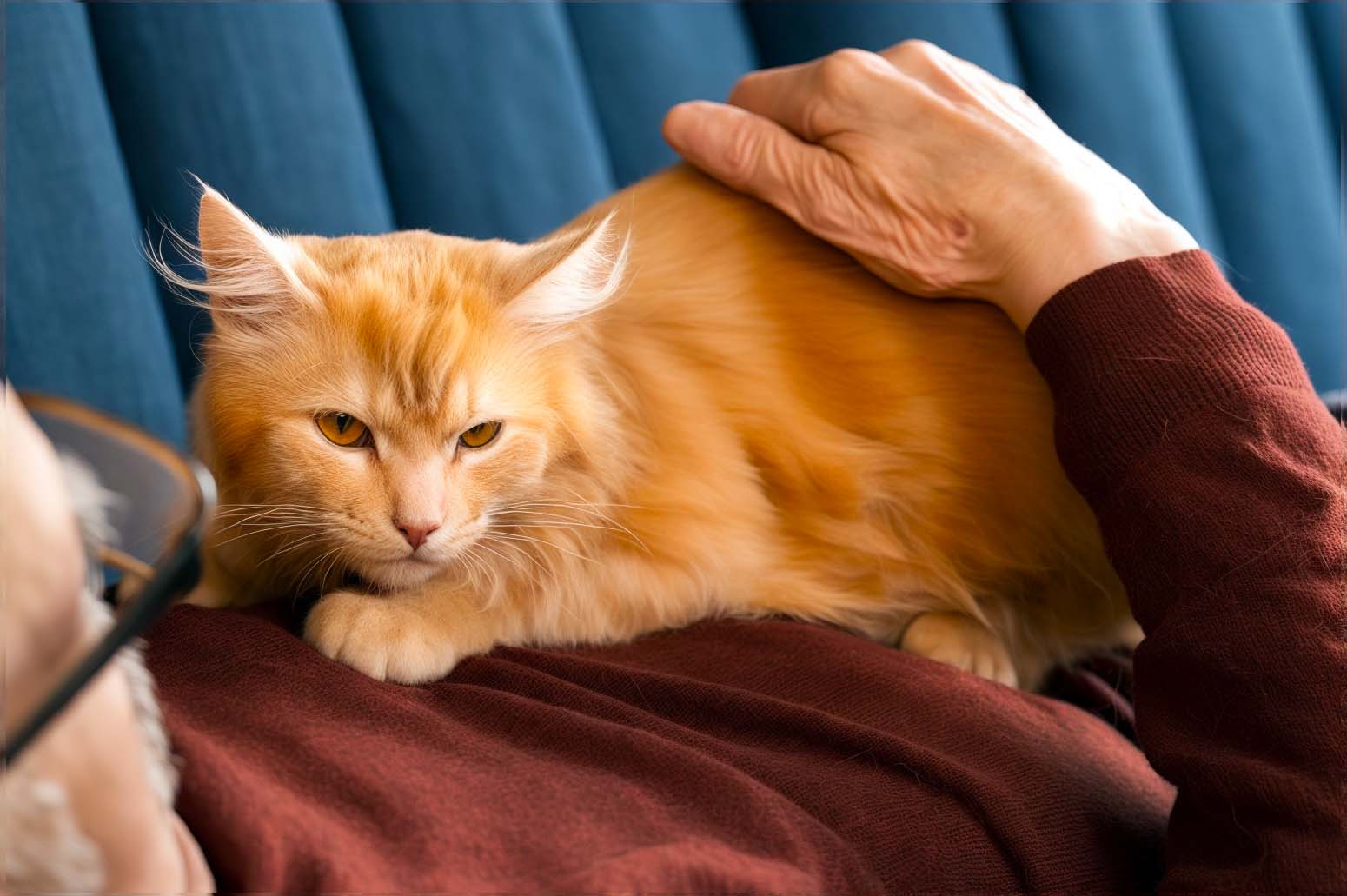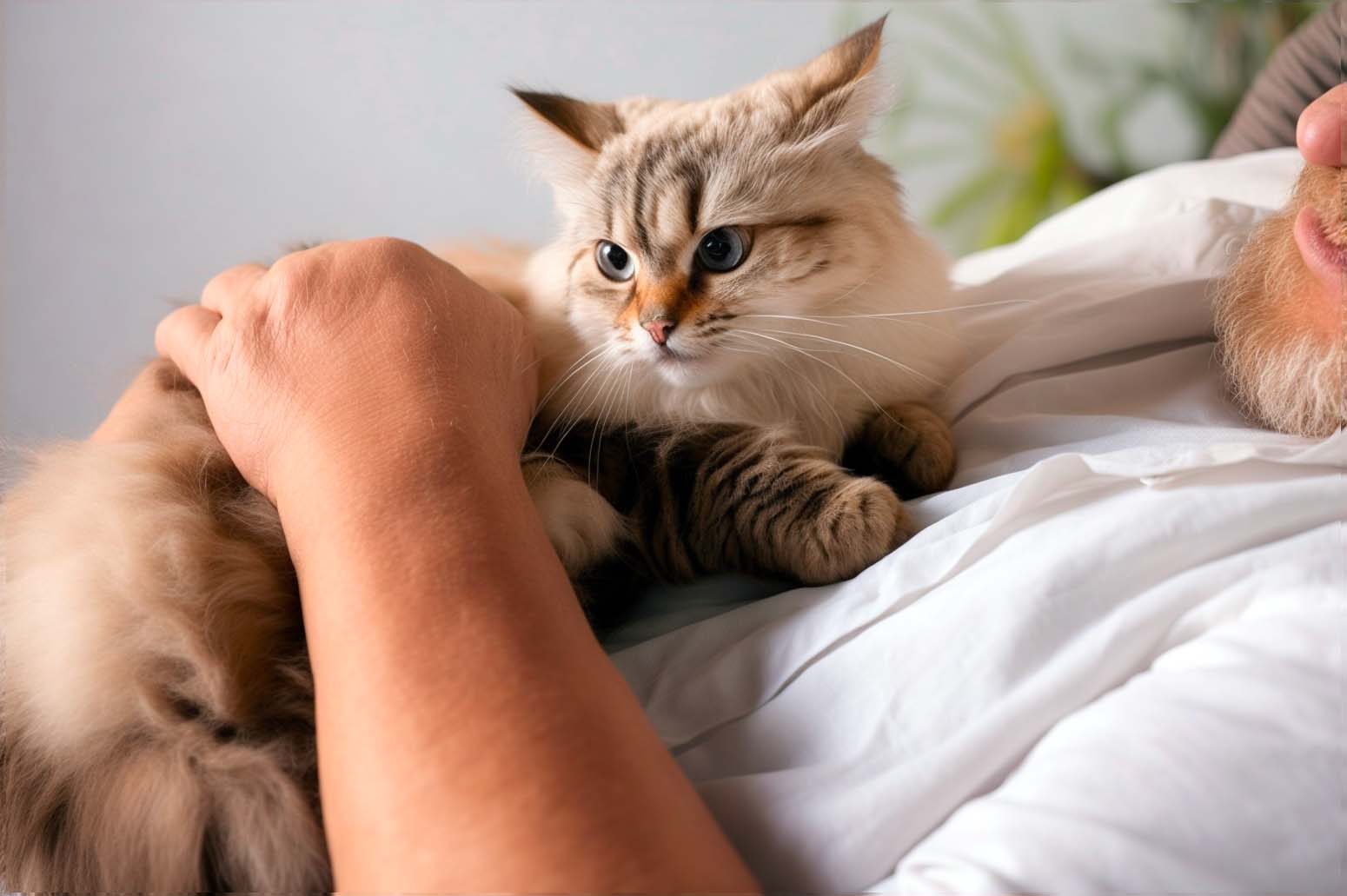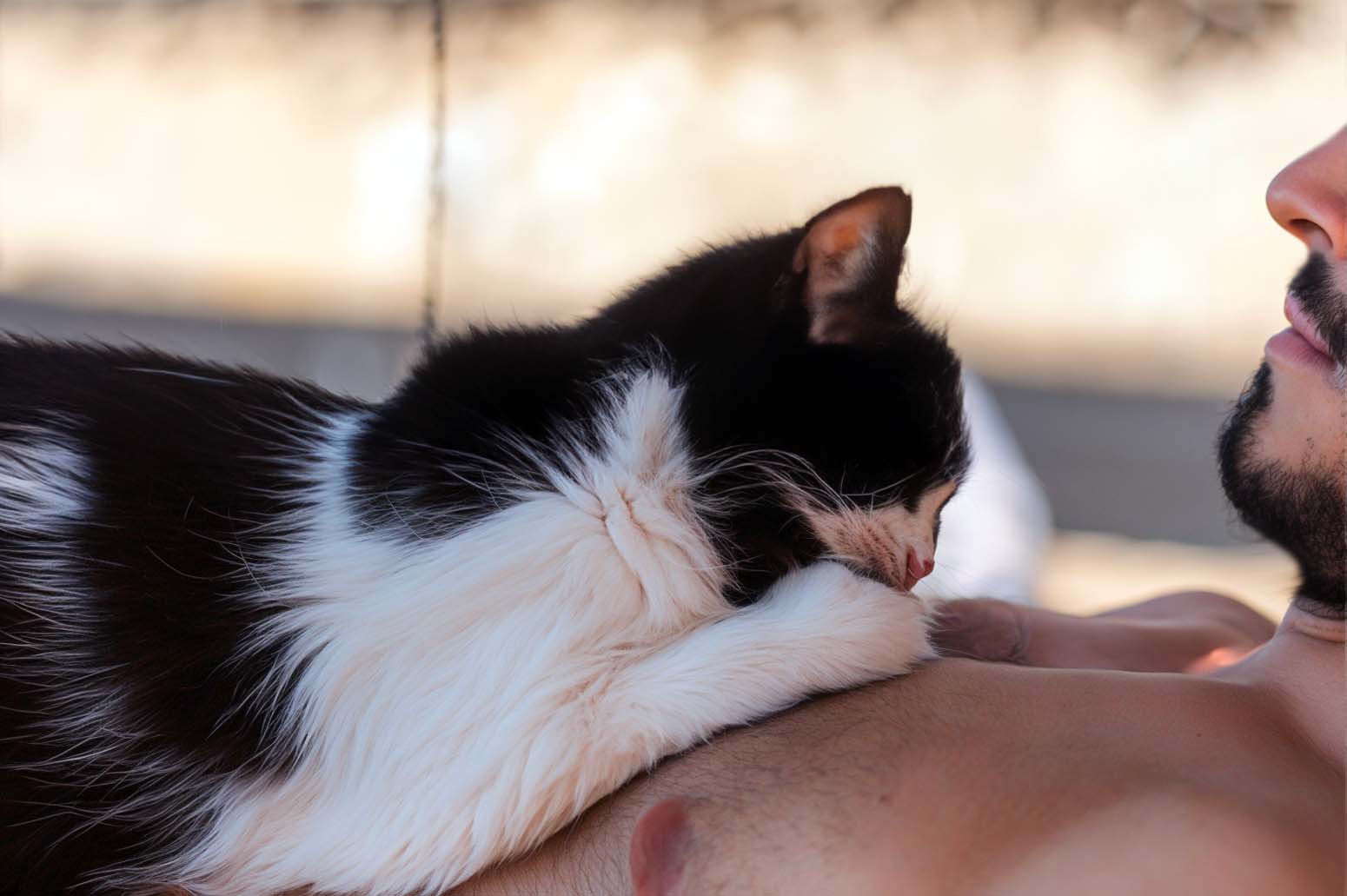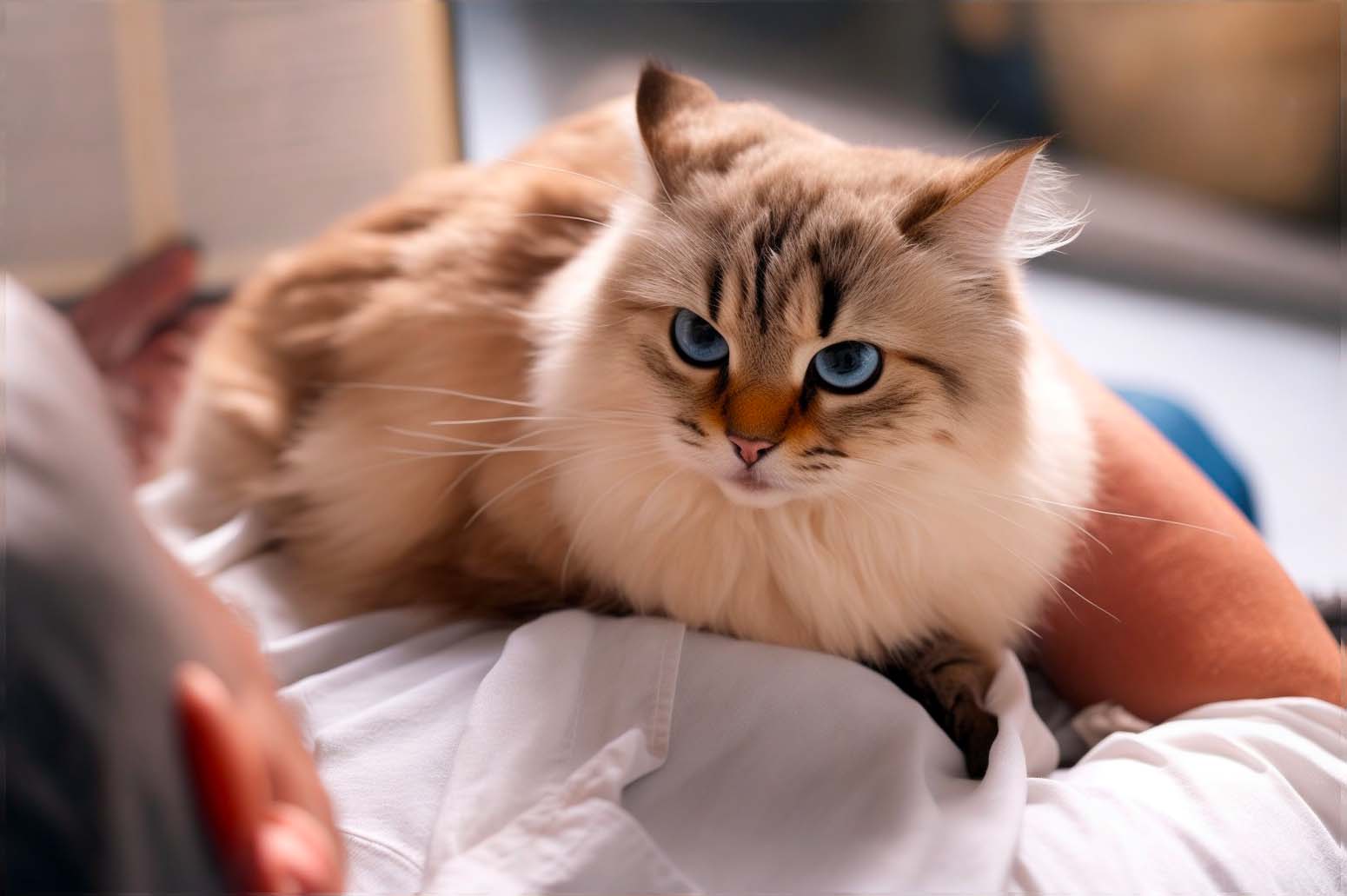Why Does My Cat Lay on My Chest? A Furry Mystery Unveiled
Ever wake up with a fluffy feline sprawled across your chest, purring like a well-oiled engine? If so, you’re far from alone. Many cat owners share this mysterious and strangely heartwarming experience. But why does your cat seem intent on crushing your lungs in the dead of night? And what possible satisfaction could they derive from your chest, of all places? It’s time we unraveled this riddle wrapped in a mystery inside an enigma… all comfortably laying on your chest!
Why does my cat lay on my chest?
Your cat lays on your chest for a variety of reasons. These range from seeking warmth, comfort and bonding with you, to enjoying your rhythmic heartbeat that mimics their purring. Furthermore, the frequencies in their purring may have potential healing properties.
We have so much more to share about this endearing, yet often puzzling, feline behavior. So if you’re ready to become a ‘cat-chest-laying’ expert, keep reading for a deep dive into the fascinating world of your feline’s favorite resting place.
The Top 10 Reasons Why Cats Lay on Your Chest
So why does your cat view your chest as the prime real estate for a perfect nap or an extended cuddle session? Here are the top ten reasons explaining this peculiar feline behavior:
- Affectionate Bonding: Cats may not be able to say “I love you,” but they certainly have unique ways of expressing affection. Laying on your chest is one such love language. This closeness enables them to feel the warmth of your body, hear the rhythm of your heart, and inhale your scent. It’s their sweet, feline way of saying, “I trust you.”
- Seeking Warmth: Cats are fond of warmer temperatures, often seeking out cozy spots. While their body temperature is slightly higher than ours, the direct heat from our bodies can provide them a comforting warmth they find irresistible, turning our chests into an inviting heated cushion for them, especially during the colder months.
- Comfort and Security: Just like us, cats crave comfort and security. The sound of your heartbeat and the rise and fall of your chest provide them with a sense of rhythm and calmness that echoes their kitten days with their mothers. The next time your cat dozes off on your chest, think of it as a feline lullaby, hypnotic and soothing.
- Claiming Territory: Cats have scent glands on their cheeks, paws, and flanks that release pheromones marking their territory. By lounging on your chest, they’re broadcasting to the world (or the other household pets), “This human is mine. Hands off!”
- Attention Seeking: If your kitty sprawls across your chest while you’re busy, they could be demanding some TLC. Let’s face it, cats are pretty savvy when it comes to getting noticed. This chest-sitting behavior is just another page from their “how to get humans to pet me” playbook.
- Monitoring Your Actions: Cats are born observers. Perched atop your chest, they get a perfect view of your actions. Plus, being in your personal space means they’re less likely to miss out on any potential cuddle or playtime opportunities.
- Healing Purr-poses: Cats’ purrs vibrate at a frequency that’s believed to promote healing and reduce stress. Some cat parents even report an improvement in their mental and physical well-being from having a purring cat on their chest. So, your kitty might be doing you a health favor!
- Asserting Dominance: Cats can have a keen sense of hierarchy. In cat language, taking the high ground (in this case, your chest) could be a sign of asserting dominance. It’s their cheeky way of stating, “I rule this roost, human.”
- Feeling Vulnerable: Cats seek their trusted humans when feeling vulnerable or unwell. Your chest, being close to your heart and voice, is their go-to safe haven. It’s a sign of utmost trust if a cat chooses to be so close to you when they’re feeling down.
- Habit or Routine: If your cat found laying on your chest enjoyable once, they would remember it and likely repeat it. Cats are creatures of habit, and they value routines that make them happy. So, if chest naps become a regular feature, congratulations – you’re officially a part of your cat’s happiness routine!
These are general guidelines and each cat is a unique, fascinating creature with their own reasons for choosing your chest as their favorite hangout spot. The key is to watch, enjoy, and appreciate these moments of closeness and companionship.
The Comforting Presence: Why Cats Choose Our Chests

There’s a saying among feline aficionados that goes, “If a cat graces your chest with their presence, consider yourself royally chosen.” Well, it’s not an official saying, but it sure sounds catchy, doesn’t it?
I recall an amusing tale of Miss Whiskers, an assertive Siamese, who loved nothing more than her human’s chest as her daily siesta spot. Even when her owner sat up, she would balance herself with such a cool catitude that the human had no choice but to adjust to her new life as a cat chair.
Now, you might be thinking, “Is this a power play?” or “Is my cat just particularly fond of my new cashmere sweater?” As it turns out, our feline friends have compelling reasons for this heartwarming behavior.
The Touch Factor
Cats have a reputation for being aloof. Still, contrary to popular belief, many cats are closeted cuddlers. They love maintaining contact with their beloved humans, and your chest offers a perfect, broad platform for them to spread out and bask in your mutual warmth.
Your Heartbeat: A Feline Lullaby
Imagine the comforting rhythm of a heartbeat, steady and calm. To your cat, your heartbeat might as well be the feline version of a sweet lullaby. It is a soothing sound that reminds them of their kittenhood, tucked up with their siblings against the warmth of their mother.
Trust in You
It takes a lot of trust for a cat to expose their belly and lay atop a giant creature (yes, that’s you). By choosing your chest as their nap spot, they are displaying profound trust and faith in you, essentially acknowledging that they view you as a safe haven.
Social Bonding or “Let’s Groom Human”
Cats often display social bonding by grooming each other, a behavior known as ‘allogrooming’. By laying on your chest, your cat might be gearing up for a grooming session. So don’t be surprised if you find your cat attempting to style your hair with their tongue.
King of the Castle
Sometimes, it’s about the perfect vantage point. Laying on your chest gives your cat an unobstructed view of their territory (yes, they still consider your house their territory). Plus, from this vantage point, they can easily spot any potential cuddle opportunities or perhaps a rogue laser pointer.
Spiritual Healing or “Purr Therapy”
Believe it or not, your cat’s purr is therapeutic. Its frequency is known to promote healing and reduce stress. If your cat often purrs while laying on your chest, consider it your personal, fluffy therapy session.
So, if you find yourself as the chosen chest, bask in the glory of it. It’s not just about comfort and convenience; it’s about trust, social bonding, and a cat’s unique way of expressing their affection for you.
The Bonding Element: Why Cats Sleep With Their Owners

In the world of pets, cats often get mislabeled as distant, independent, or the cool aloof roommate who likes you just enough to share the rent (and by rent, I mean your grocery bill!). But the truth, my dear reader, is far more interesting. Cats, in fact, are a bubbling cauldron of affection, waiting to spill over to their chosen ones – us, the humans. And one of the best ways they demonstrate this bond is by cozying up with their owners, often claiming the high throne of the chest for their royal slumber.
Consider a common scene: A cat, after an adventurous day of roaming the house, chooses to curl up on its owner’s chest every single night without fail. Regardless of where the cat’s curiosity takes it, as nightfall arrives, the cat can be found purring contently, sleeping on its owner’s chest. This isn’t a rare or unique behavior – it’s a testament to the emotional complexity of our feline companions.
In a fascinating report published in the National Library of Medicine, it was found that 60% of cats are allowed on the bed, and a good 30% of them sleep with their owners. These numbers point towards a unique inter-species relationship that extends well beyond the basics of food and shelter.
You see, cats are much more emotionally complex creatures than we often give them credit for. Despite their independent streak, they forge powerful emotional connections with their humans. And sleeping with you is a classic example of this connection.
The Human-Cat Bond: A Tale as Old as Time
Historically, cats have had a fascinating journey. They went from being worshipped in ancient Egyptian societies to being vilified during the Middle Ages, and now, they’re one of the most popular pets worldwide! This rollercoaster relationship with humans is testament to the strong bond between our species.
Cats, by nature, are territorial creatures who mark their space by rubbing their cheeks or scratching surfaces. If your cat rubs against you or kneads on your chest, consider yourself marked as a trusted part of their territory. Essentially, your cat views you as an extension of itself.
This interaction forms the basis of the bonding process. And what better way to strengthen this bond than by sleeping together, the ultimate display of trust in the animal kingdom?
So, the next time your furry friend hops onto your chest for a night’s rest, remember that it’s not just about a cozy bed. It’s a testament to the profound bond you share, a love story, if you will, between human and cat.
Cat Behaviors: Sleeping Positions and What They Mean

Let’s talk about the feline language of love – or more precisely, the language of sleep. Like a well-choreographed ballet, cats perform a whole array of sleeping positions that can tell us a lot about their mood, comfort, and feelings towards us. And yes, we’re finally tackling the question that keeps many of us up at night: “Why do cats sit on your chest backwards?” But let’s build up to that crescendo. Here’s a breakdown of some common feline siestas and what they likely mean.
The Loaf of Bread
Have you ever noticed your cat sitting upright, with its paws neatly tucked under its body? This position is affectionately called the “Loaf of Bread”. Cats generally adopt this position when they’re comfortable but still want to keep an eye on their surroundings.
The Belly-Up
If your cat lies on its back, showing off its belly, congratulations! This is a clear sign of trust and contentment. Cats expose their bellies when they feel safe and secure, as it’s one of their most vulnerable areas.
The Sphinx
Cats in the Sphinx position look exactly like their ancient Egyptian statue counterparts – upright, regal, and slightly mysterious. This is a relaxed posture that still allows for a quick reaction, just in case a sudden game of chase ensues.
The Chest Cuddle
Now for the piece de resistance – the chest cuddle. When your cat curls up on your chest, it’s showing a high level of trust and affection. This position allows them to feel your heartbeat and warmth, simulating the comfort they felt with their mother.
The Backwards Chest Sit
And now, the enigmatic question of why cats sit on your chest, backwards. This behavior is another delightful display of trust. Sitting backward on your chest allows your cat to keep an eye on the environment while enjoying your warmth and proximity. It’s like their version of watching a movie with their best friend – you!
In the end, remember, each cat is an individual with its own unique personality and quirks. These interpretations are generalizations, and your cat may have its own special reasons for the way it sleeps. However, if your cat consistently chooses to sleep with you or on you, take it as a badge of honor. You have been chosen by one of the most discerning creatures on the planet!
The Night-time Intrigue: Cats Laying on Chests in the Middle of The Night

“Why does my cat lay on my chest in the middle of the night?” If I had a nickel for every time I’ve heard that question, I could buy a lifetime supply of catnip. Whether you’ve experienced this yourself or know someone who has, it’s clear: the night holds a certain fascination for our feline friends. So why do they choose our chests as their preferred nocturnal perch?
As natural nocturnal beings, cats are biologically wired to be more active during the night. Back in their wild days, cats were hunters who prowled the night, so their heightened nocturnal activity is merely a remnant of their past.
Now, let’s link this back to their love for chest cuddles. Our feline companions have an innate need for warmth and security. Your chest, with its rhythmic heartbeat and radiating warmth, ticks both these boxes. It’s like a cozy, secure nest that just happens to have a built-in heater – perfect for a peaceful slumber or, at the very least, a quick cat nap!
If your kitty is a midnight chest cuddler, they might also be seeking your attention when you’re not preoccupied with anything else. At night, all the hustle and bustle of the day comes to a halt, making it the purrfect time for some bonding with their human. It’s a calm, quiet time when they have your undivided attention (even if you are technically unconscious!).
But what about those of you asking, “why is my cat suddenly laying on my chest?” There could be several reasons for this change in behavior. It could be a sign of increased trust and bonding. Alternatively, it could be their way of seeking more warmth, comfort, or attention. But, as always, if you notice any drastic changes in your cat’s behavior, it’s always a good idea to consult your vet.
Cats laying on chests in the middle of the night isn’t just a peculiar cat quirk; it’s a testament to their trust, their bond with you, and their uncanny knack for finding the coziest spots! So the next time you wake up to find a purring furball on your chest, just remember: it’s their way of saying, “You’re mine, and I love you.”
The Purring Phenomenon: A Therapeutic Symphony on Your Chest

A cat’s purr is more than just a soothing hum—it might also be a natural healing mechanism. When your feline friend lounges on your chest and purrs, this intimate moment could be offering you more than just emotional comfort.
Cats are known for their non-verbal communication prowess, and purring is a significant part of their expressive repertoire. They purr during various emotional states and physical conditions, from absolute contentment to distress or even labor.
The Healing Purr: Scientific Insight
The question “Do cats lay on your chest to heal you?” might sound fantastical, yet science suggests there could be a kernel of truth in it. Researchers have been intrigued by the healing potential of a cat’s purr.
A study published in the Journal of the Acoustical Society of America reveals that cats, including domestic ones, generate frequencies between 25 and 150 Hertz during purring. Interestingly, these frequencies correspond with those used in medical therapies for promoting healing in conditions like bone fractures, pain, edema, and wounds.
Elizabeth von Muggenthaler, a bioacoustics specialist at the Fauna Communications Research Institute in North Carolina, supports these findings, adding that the average domestic cat’s purr falls within this frequency range. In humans, exposure to frequencies between 20 and 50 Hertz has been linked to increased bone density and muscle relaxation.
Purr Therapy in Practice
The therapeutic potential of a cat’s purr has already been translated into practice. Pulsed electromagnetic field (PEMF) devices mimicking a cat’s purr have shown promise in non-invasive treatment of biological disorders. One particularly inspiring case involved an elderly dog that regained its ability to walk after just three days of treatment with a PEMF device.
Why Does My Cat Purr On My Chest?
While the full therapeutic effect of a cat’s purr is still a subject of ongoing research, the theory adds an extra layer of fascination to our understanding of feline behavior. When your cat lays on your chest and purrs, it’s more than a show of trust and affection—it could be an instinctual healing process at work.
Whether or not your cat’s chest-cuddles come with bonus healing properties, the emotional comfort and stress relief they provide are undeniable. So, enjoy these heartwarming moments with your purring companion. It’s not just soothing—it could be the purr-fect therapy!
A Spiritual Connection: The Symbolism of Cats on Chests

Hold on to your tin-foil hats, folks, because now we’re going to delve into the spiritual realm! Cats have been venerated, worshipped, and held as symbols of mystery and magic across various cultures throughout history. They were divine in Ancient Egypt and said to possess mystical powers in various folklore. But let’s circle back to our feline friends snoozing on our chests. What could be the spiritual meaning behind that?
It’s said that cats are more attuned to the spiritual world than we humans are. Whether or not you subscribe to this belief, there’s no denying the serenity and calm that pervades when a cat curls up on your chest and begins to purr. The heart-to-heart connection is palpable, creating an atmosphere that feels almost… sacred.
The spiritual belief is that when a cat chooses to sleep on your chest, it’s not just seeking warmth or marking its territory – it’s also aligning itself with your heart chakra. In certain spiritual traditions, particularly those derived from Eastern philosophy, chakras are considered the energy centers of the body. The heart chakra, in particular, is associated with love, compassion, and emotional well-being. By sleeping on your chest, your cat could be showing its alignment with these emotions, or perhaps offering comfort and healing on an emotional level.
An additional spiritual perspective is the belief that cats can see and interact with spirits and energies that we can’t perceive. If you’re someone who’s been feeling a bit low or stressed, your feline companion might just be doing its bit to ward off negative energy. Think of it as your personal spiritual bodyguard, whiskers and all!
That said, it’s essential to remember that all these interpretations are inherently subjective. Different cultures and spiritual beliefs offer various interpretations of our interactions with cats. If nothing else, these perspectives make our relationships with our feline friends even more intriguing!
Whether or not your cat sleeping on your chest holds a profound spiritual meaning is ultimately a personal belief. But one thing is undeniable: the connection between a cat and its owner is unique and precious. And when your cat chooses to demonstrate its love and trust by laying on your chest, it’s an experience to be treasured, regardless of its spiritual implications.
Now, the next time your furry friend decides to turn you into its personal bed, remember – it’s not just a catnap; it could be a little slice of divine intervention!
Other Curious Behaviors: Cats Laying on Stomachs and Necks
If you thought your kitty’s fascination with your chest was the only quirk you had to navigate, brace yourself! Many cat owners have also reported their feline friends opting for alternative nap spots like stomachs and necks. Yes, necks. And if you’re wondering why, welcome to the club! Let’s try to unravel these mysterious behaviors together.
Why Does My Cat Lay on My Stomach?
First off, if you’ve ever found your cat comfortably snoozing on your stomach, don’t worry – you’re not alone. Cats choose the stomach for the same reasons they pick the chest: warmth, rhythm, and scent. Moreover, your stomach area tends to be softer and squishier (no offence intended!) than other parts, making it a perfect cat mattress.
A fascinating observation is that many pregnant women report their cats suddenly taking a liking to their bellies. Cats have excellent instincts and are often aware of changes in their human’s bodies before we even notice them. If your cat is being unusually attracted to your tummy, it might be worth considering if there’s a little one on the way!
Why Does My Cat Lay on My Neck?
Now, for the neck. It’s not the most comfortable position for us, admittedly, but cats seem to love it. Your neck area exudes warmth and pulsates with life, which is probably what draws them there. Cats also love the smell of their humans, and each of us has a unique scent that is strongest in the neck area. So when your kitty gets all up in your neck space, it’s probably just enjoying your personal “Eau de Human.”
Furthermore, cats consider their owners a part of their family – or to be more precise, their “clowder.” In the wild, cats in the same clowder snuggle up together for comfort and security. By getting as close to your face as possible, your cat may just be saying, “You’re family, and I trust you.”
Advice to Cat Owners
Here’s the bottom line: if your cat’s choice of napping spot isn’t causing discomfort or any health issues (like allergies or breathing difficulties), then there’s no need to worry. It’s just another one of their quirky behaviors that make them the unique, lovable creatures they are.
However, if it does become a problem, it’s essential to redirect their behavior gently. Abruptly pushing them off may make them anxious or confused. Instead, try moving them to their own cozy bed or a warm blanket nearby. Remember, consistency is key. The more consistently you guide them to a new spot, the more likely they are to accept it as their new sleeping zone.
At the end of the day, each cat is a world unto itself, with unique behaviors, quirks, and preferences. Embrace these little idiosyncrasies – they’re what make your bond with your feline companion so special!
Conclusion: Understanding and Appreciating Our Feline Friends
Throughout this exploration, we’ve discovered a multitude of reasons behind why cats lay on our chests—from seeking warmth and comfort, marking their territory, or even potentially assisting in our healing process. It’s truly fascinating to learn how multifaceted our feline companions are, and how their seemingly simple behaviors can have such profound meanings.
Every time your cat decides to settle on your chest, remember it’s a sign of trust, affection, and possibly their way of contributing to your wellbeing. So, the next time you find yourself as a cat’s chosen spot, take a moment to appreciate this unique bonding experience. Whether it’s for warmth, safety, bonding, or the fascinating possibility of their healing purr, the love we share with our cats is irreplaceable.
Embrace these moments and let them serve as a gentle reminder of the strong bond you share with your furry friend. After all, in the world of cats, there is no higher compliment than being chosen as their favorite place to relax. In understanding their behaviors, we can foster a deeper connection and cohabitation harmony with our purring pals. Here’s to many more chest cuddles and healing purrs in the days to come!

